Appendix to Proposed Rule:
Appendix C (to Revision of the Commission's Auditor Independence Requirements)
Investment in Audit Client
Reg. § 210.2-01(c)(1)(i)(A),(B) and (C)
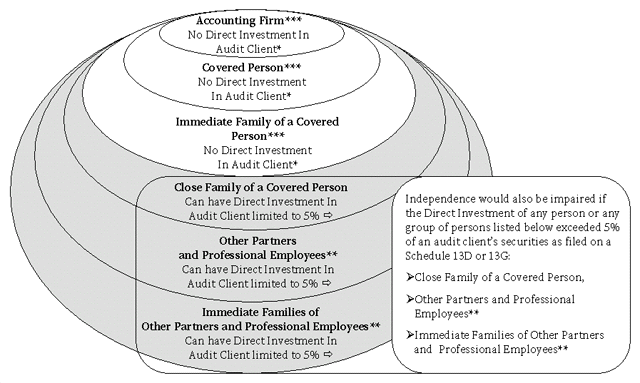
* Includes affiliates of the audit client
** Other Partners and Professional Employees includes partners, principals, shareholders and professional employees that are not covered persons
*** The accounting firm, a covered person and the immediate family of a covered person can not be a voting trustee of a trust or executor of an estate containing the securities of an audit client.
Material Indirect Investments
Reg. § 210.2-01(c)(1)(i)(D)(1) Investment in Audit Client
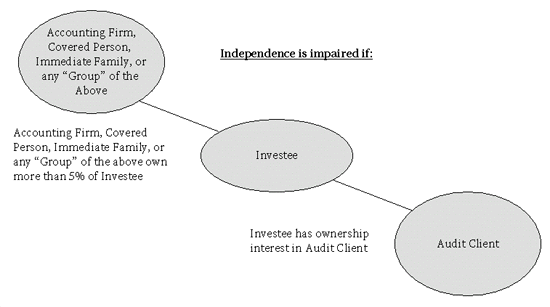
Material Indirect Investments
Reg. § 210.2-01(c)(1)(i)(D)(2) Investment in Audit Client
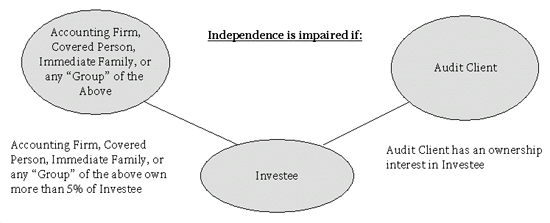
Investment Company Complex
Reg. § 210.2-01(c)(1)(ii)(G)
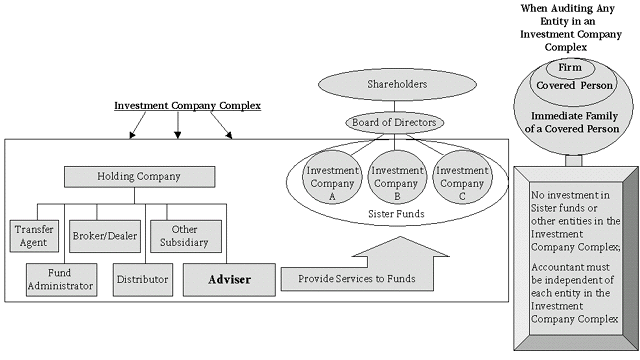
Reg. § 210.2-01(f)(16)(i) "Investment Company Complex" includes:
(A) An investment company and its investment adviser or sponsor;
(B) any entity controlled by, under common control with, or controlling the investment adviser or sponsor in paragraph (f)(16)(A) of this section; or
(C) any investment company or entity that would be an investment company but for the exclusions provided by section 3(c) of the Investment Company Act of 1940 that has an investment adviser or sponsor included in this definition by either subparagraph (f)(16)(A) or (f)(16)(B)
(ii) An investment adviser, for purposes of this definition, does not include a sub-adviser whose role is primarily portfolio management and is subcontracted with or overseen by another investment adviser.
(iii) Sponsor, for purposes of this definition, is an entity that establishes a unit investment trust.
Affiliates of the Audit Client
Reg. § 210.2-01(f)(5)
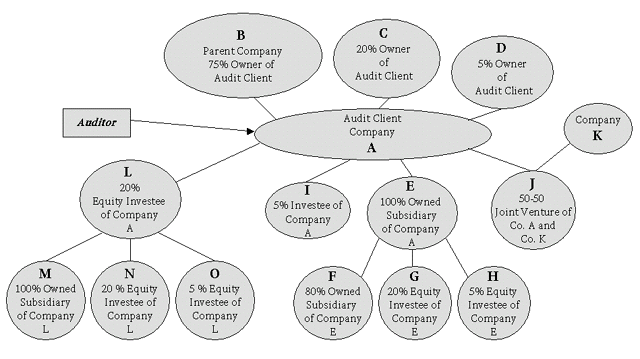
Note: A detailed analysis follows applying the proposed rules to Direct and Material Indirect Financial Interests in the Audit Client and Affiliates of the Audit Client, Employment of Relatives of a Covered Person, and Non-Audit Services
Direct Investments in the Audit Client or an Affiliate of the Audit Client
Section (c)(1)(i)(A) of the proposed rule states that an accountant is not independent when the Accounting Firm, any Covered Person in the firm or a member of the Immediate Family of a Covered Person in the firm has any direct investment in an "Audit Client" or an "Affiliate of the Audit Client." Section (f)(5) of the proposed rule defines "Affiliate of the Audit Client" as an entity that has significant influence over the audit client, or over which the audit client has significant influence. Also, under APB No. 18 as noted in the release, there is a presumption of significant influence where an entity owns 20% or more of an audit client or where the audit client owns 20% or more of an entity. For purposes of these examples, we assume that there are no other factors rebutting the presumption of significant influence under APB No. 18.
Both B and C own 20% or more of the Audit Client. In addition, the Audit Client owns 20% or more of E, which in turn owns 20% or more of F and G. The Audit Client also owns 20% of L which in turn owns 20% or more of M and N. Finally, the Audit Client owns more than 20% of J. Thus, in addition to being precluded from directly investing in A, the Accounting Firm, any Covered Person in the firm and the Immediate Families of Covered Persons in the firm would be precluded from directly investing in companies B, C, E, F, G, L, M, N, and J since these entities are affiliates of the audit client.
With respect to D, I, H, and O there is no presumption of significant influence since D only owns 5% of the Audit Client and the Audit Client only owns 5% of I and the entities over which A has significant influence, E and L, only own 5% of H and O, respectively. Under APB No. 18, as noted in the release, there could be other indicia that would cause D's ownership of the Audit Client or the Audit Client's ownership of 5% of I (as well as E's ownership of H or L's ownership of O) to rise to the level of "significant influence" such that D, I, H or O would then be affiliates of the audit client and the accountant's independence would be impaired by direct investments in those entities.
J is an Affiliate of the Audit Client because the Audit Client owns more than 20% of J and thus has "significant influence" over J. However, K is not an Affiliate of the Audit Client because the Audit Client does not have "significant influence" over K and the accountant's independence would not be impaired by direct investments in K.
Therefore, the Accounting Firm, Covered Persons and the Immediate Families of Covered Persons would not be precluded from investing in D, I, H, O, and K. Investments in D, I, H, and O could not exceed 5% of the voting interests of these entities as described under "Material Indirect Investment in an Audit Client or an Affiliate of the Audit Client" below.
Investments Reportable on Schedule 13d or 13G or Otherwise Control the Audit Client
Section (c)(1)(i)(B) of the proposed rule states that an accountant would not be independent if any partner, principal, shareholder, or professional employee of the accounting firm, any of his or her immediate family members, any close family member of a covered person in the firm, or any group of the above persons has filed a Schedule 13D or 13G with the Commission indicating record or beneficial ownership of more than five percent of an audit client's equity securities, or otherwise controls an audit client.
As noted above, partners and professionals in the firm other than covered persons, and their immediate families and the close family members of covered persons would not be precluded from investing in the Audit Client, A. Section (c)(1)(i)(B) of the proposed rule operates to, among other things, preclude professionals in the firm from acting as a group to control the audit client. Thus, the accountant would not be independent when any partner or professional in the firm other than a covered person, a member of their immediate family, or the close family member of a covered person filed a Schedule 13D or 13G (generally required for investments over 5%) with the Commission or otherwise controlled the Audit Client, A.
Material Indirect Investment in an Audit Client or an Affiliate of the Audit Client
Section (c)(1)(i)(D) of the proposed rule states that an accountant would not be independent if the accounting firm, any covered person in the firm or the immediate family member of a covered person or any group of these persons owned more than 5% of an entity that has an ownership interest in the audit client or more than 5% of an entity of which the audit client has an ownership interest.
Assuming that D, I, H, and O are not affiliates, the accounting firm, a covered person in the firm or the immediate family of a covered person or any group of these persons could own up to 5% of these entities without impairing independence since a 5% investment would be considered an immaterial indirect investment in the Audit Client, A.
Employment of Relatives of a Covered Person
Section (c)(2)(ii) of the proposed rule states that an accountant will not be independent if a close family member of a covered person in the firm is in an accounting or financial reporting oversight role at an audit client or an affiliate of an audit client or was in such a role during any period covered by an audit for which the covered person in the firm is a covered person.
As noted above, B, C, E, F, G, L, M, N, and J are affiliates of the audit client. Consequently, the accountant would not be independent when any close family member of a covered person in the firm was employed in an accounting or financial reporting oversight role at the Audit Client A or the affiliates of the audit client, B, C, E, F, G, L, M, N, or J.
Subject to the general standard, a close family member of a covered person could work in any position at D, I, H, O, or K since those entities are not affiliates of the audit client.
Non-Audit Services
Section (c)(4)(i) of the proposed rule provides that an accountant will not be independent when the accountant provides certain non-audit services to an audit client or an affiliate of an audit client.
Accordingly, the accountant would not be independent if the accounting firm provided any prohibited non-audit services to the Audit Client, A, or to any affiliate of the audit client including B, C, E, F, G, L, M, N, and J. Subject to the general standard, the firm would not be precluded from providing non-audit services to D, I, H, O, or K since these entities are not affiliates of the audit client.
http://www.sec.gov/rules/proposed/3442994c.htm

